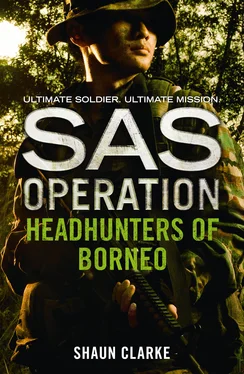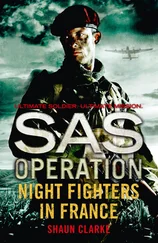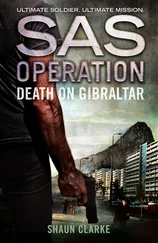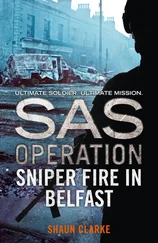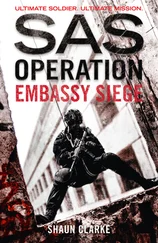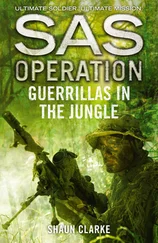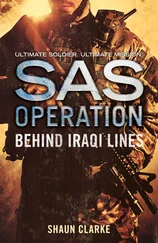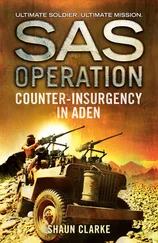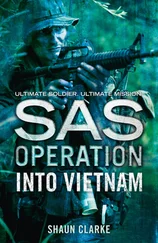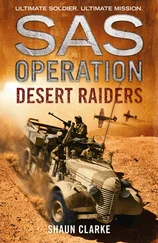By the end of the two weeks, close relationships had been formed between the villagers and the SAS men, with the former willing to listen to the latter and do favours for them.
‘The time’s come to bring in the regular troops and fortify the kampong,’ Sergeant Hunt informed Dead-eye. ‘Then we can go out on proper jungle patrols, using the village as our FOB.’
‘Do you think the locals will wear it?’
‘That depends entirely on how we put it to them,’ Hunt said with a relaxed grin. ‘I think I know how to do that. First we tell them that evil men from across the mountain are coming and that we’re here to protect the village. Then we explain that although our group is only five in number, we have many friends who’ll descend from the sky, bringing aid. It would be particularly helpful, we’ll then explain, if the necessary space could be created for the flying soldiers to land safely. I think that might work.’
‘Let’s try it,’ Dead-eye said.
That afternoon they approached the village elders, joining them in the headman’s longhouse, where they were compelled to partake of the foul-smelling jarit , mercifully washing it down with the scalding, highly alcoholic rice wine. After four hours of small talk, by which time both troopers were feeling drunk, Hunt put his case to the headman and received a toothless, drunken smile and nod of agreement. The headman then also agreed to have a landing space cleared for the flying soldiers to land on. Indeed, he and the others expressed great excitement at the thought of witnessing this heavenly arrival.
Immediately on leaving the longhouse, Hunt, trying not to show his drunkenness, told Terry to call up A Squadron and ask them to implement the ‘step-up’ technique devised by their brilliant commander, Major Peter de la Billière. This entailed warning a full infantry company to be ready to move by helicopter to a remote forward location for a demonstration of quick deployment and firepower.
The following day, when Hunt and Dead-eye were sober, the tribesmen expertly felled a large number of trees with small, flexible axes, dragged them away with ropes, then flattened the cleared area, thus carving a helicopter landing zone out of the jungle. When they had completed this task and were waiting excitedly around the edge of the LZ for the arrival of the ‘flying soldiers’, Hunt ordered Terry to radio the message: ‘Bring in the step-up party now.’ About fifteen minutes later the helicopters appeared above the treetops, creating a tremendous din and a sea of swirling foliage, before descending vertically into the clearing and disgorging many small, sombre Gurkhas, all armed with sharpened kukris , or curved machetes, and modern weapons. The next wave of choppers brought in Royal Marine Commandos, the regular Army, and the remainder of D Squadron, SAS, all of whom were armed to the teeth.
The Ibans giggled, shrieked with excitement, and finally applauded with waves and the swinging of their blowpipes. They viewed the arrival of the Security Forces as pure entertainment.
With the arrival of the full Security Forces complement, the fortification of the kampong was soon accomplished and it became, in effect, a Forward Operating Base complete with landing pads for the resup Wessex Mark 1 helicopters; riverside sangars manned with Bren light machine-guns and Gurkhas armed with 7.62mm SLRs; and defensive pits, or ‘hedgehogs’, encircled by thatch-and-bamboo-covered 40-gallon drums, bristling with 4.2-inch mortars and 7.62mm general-purpose machine-guns, or GPMGs.
The bartering of portable radios, simple medical aid and other items beloved by the villagers rapidly ensured that the SF troops became a welcome body of men within the community – so much so that eventually the natives were making endless requests for helicopter trips to outlying kampongs and help with the transportation to market, also by chopper, of their rice and tapioca, timber and even pigs and chickens. In short, they came to rely more on the soldiers and airmen than on their own civilian administration.
‘Like living in fucking Petticoat Lane,’ Alf said. ‘If you don’t know how to barter you’re doomed. A right bunch of Jew-boys, this lot are.’
‘Jew-boys in loincloths,’ Pete added. ‘With long hair and a lot of weird tattoos. They’d look pretty normal in the East End, peddling their wares.’
‘Do you mind?’ Terry said.
‘What’s that, Trooper?’ Pete asked.
‘I don’t think you should use terms like “Jew-boys”. I think it’s offensive.’
‘But you’re Irish!’ Alf exclaimed.
‘Just born there,’ Terry corrected him.
‘If you were born there, that makes you fucking Irish, so don’t come it with me, Pat.’
‘Don’t call me Pat.’
‘His name’s Paddy ,’ Pete exclaimed.
‘He must be an Irish Jew,’ Alf responded, ‘to be so concerned about this lot.’
‘I’m not Jewish,’ Terry said. ‘I’m not really Irish either. I just happened to be born there, that’s all, but my family moved to Liverpool when I was three, so I don’t know any more about Ireland than you two. I’m not Irish, really, and I’m certainly not a Jew. I just dislike anti-Semitism, that’s all.’
‘The cocky bastard’s just picked up his winged dagger and already he thinks he can give us lectures. Makes you wonder, doesn’t it?’ said Pete.
‘I just meant…’ began Terry.
‘Don’t worry, kid,’ Alf said in his kindly manner, ‘we’re not remotely offended. We just think you’re a dumb prat.’
‘Hear, hear,’ Pete agreed.
Despite the sentiments of Alf and Pete, the SAS troopers, being already experienced in hearts-and-minds work, were very skilled at it. Major Callaghan, who loved life in the jungle and had revelled in kampong life ever since his Malayan days, made his contribution by flying out, at his own expense, hampers of Christmas food from Fortnum and Mason’s of London, to supply the natives. Not surprisingly, Pete’s only comment was: ‘They eat better than we do. Spoiled rotten those Indians are.’
‘Fortnum and Mason’s, no less!’ Alf exclaimed, his normally pink cheeks more flushed than normal. ‘And here we poor bastards sit, getting sick on raw pork and tapioca. Makes you want to puke, doesn’t it?’
Sergeant Hunt, on the other hand, being of a practical bent, made his personal contribution to village life by constructing a water-powered generator to provide the only electric light in thousands of square miles. This thrilled the villagers.
Not to be outdone, Corporal Sanderson, whose four-day trek through the jungle after the attack on Long Jawi the previous year had already gained him a great deal of respect among his fellow SAS troopers, dismantled his bergen and converted its metal frame into a still for making alcohol.
‘He may be from A Squadron,’ Pete said, ‘but he’s all right with me. Any man who can make a still from a rucksack has to be A1.’
‘I’ll drink to that,’ Alf replied, sampling the brew from Sanderson’s still. ‘But then I’ll drink to anything!’
While most of the men clearly enjoyed making such contributions to village life, they never lost sight of precisely why they were making them: to win the hearts and minds of the Ibans, and persuade them to favour the SF forces over those of President Sukarno or the CCO. The message that accompanied their contributions was therefore always the same.
‘The Indonesians and the CCO are on the other side of the mountains and one day they’ll cross them to destroy you,’ Dead-eye, the language specialist, would solemnly inform the locals in their own tongue. ‘We are here to protect you.’
Once they had managed to convince the villagers of this, the SAS men were able to convince them also that they must help themselves by staying alert for anything unusual seen in the ulu .
Читать дальше
